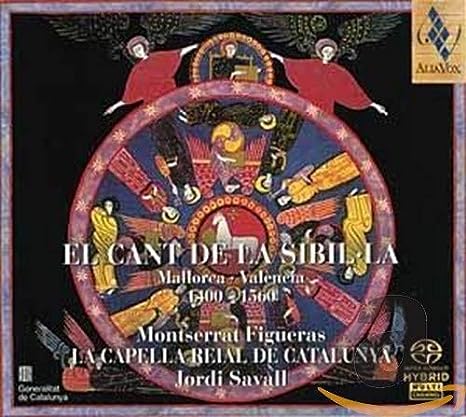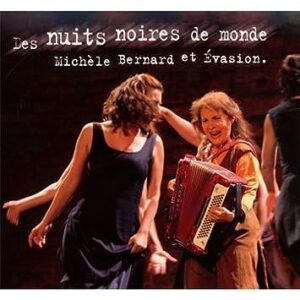Additional information
| Is Discontinued By Manufacturer | No |
|---|---|
| Language | English |
| Product Dimensions | 4.99 x 5.57 x 0.38 inches, 3.52 Ounces |
| Manufacturer | ALIA VOX |
| Original Release Date | 1999 |
| SPARS Code | DDD |
| Date First Available | July 27, 2006 |
| Label | ALIA VOX |
| Number of discs | 1 |





Chesapeake Bishop –
For however beautiful is Montserrat’s voice, the haunting character of the chant, the breaking into polyphony in the third movement, it remains that these ancient texts are positively frightening and heart stopping, the imputed music adding to the gravity of their meaning. The work is appropriate for our time in which we are destroying the earth through the carbon detritus of our unbridled materialism. Moreover, I am glad to have this fine recording, though uncertain how frequently I will play it. Perhaps to hear over and again the third movement, the Catalonian text, will be bracing fine.
Aiea Hammer Boy –
GREAT CD…. Okay packaging and shipping. Good seller. This is now my favorite CD and I’ve listened to it about a dozen times.
Strongly recommended.
Pat 67 –
Superbe interprétation et enregistrement. A conseiller à tous ceux qui aiment Montserrat Figueras et ce genre de musique, triste il est vrai, mais tellement prenante.
PALMADE Hervé –
Un CD, c’est pour l’écouter !
Bien sûr il fat aimer !!
genyc –
5 star
Marianne van Ravenswaay –
Beautiful!
C. Nobili –
Une voix superbe et envoûtante, rehaussée par un choeur de femmes. Un CD qui permet de s’élever à plus de beauté et de spiritualité.
Chris Shenton –
Achingly beautiful — quiet and powerful. Montserrat Figueras’ voice is stunning, pure, sometimes piercing. I’m not a classical or ancient music aficionado, but this music haunts me (in the same way that Arvo Pärt’s music does). The liner notes give terrific insight into the culture of the time, frame the music.
Jonno –
Alia Vox appear to have perfected the art of minimalist recording in stone-faced church or historic venues. Although this is not one of their most recent releases, the results (SACD stereo layer) are wonderfully transparent, natural and vibrant-sounding, with stunning stage depth and ambience.
As always, Savall and his choral and instrumental forces make unforced, idiomatic music, with the divine Montserrat Figuerras – here in her prime – gracing the performances with her beautifully fluid and expressive voice.
The Sibyline chants from medieval Spain, themed around the apocalyptic end of days – make a strong impact on many levels. The repetitive Mallorca chant, in particular, is hypnotic in its musical and expressive impact; in fact, it sounds eerily reminiscent of Aavo Part’s ‘holy minimalism’, albeit 600 years early!
From a modern, secular, post-enlightenment perspective, we can see the religious texts as basically obnoxious, irrational and utterly incomprehensible. The xenophobic, anti-semitic, god- and hell-fearing medieval European mind of the 1400s is indeed a strange place to explore.
But that does not in any way detract from the sonic and musical merits of this stimulating and thought-provoking SACD.
Weesel –
I have the earlier Cant de la Sibil by Hesperion XX and I really enjoy it — all three versions. Not sure why I purchased this one, but am I ever glad that I did. The first Sybil on this CD is mostly a female choir accompanied by agitated strings. Very moving. The second Sybil is more of a surprise: an interesting variation on the ‘usual’ fanfare, the same impassioned performance by Montserrat, but some surprising instrumental interludes which caught me by surprise. Sorry, I’m not giving the full story here. Some things should be experienced fresh. Let me just add that the choir is a mixed male and female ensemble and the harmonies are magical.
I have to wonder if five sybils are enough… I just found another one! Dare I? 😉
Arthur –
On ne présente pas la maison Sarvall. Pour en avoir en ma posséssion plusieurs d’entre eux, celui-ci à sa propre particularité, très beau, grande sensibilité. J’adore !!
Dr Geoff Vincent –
Stunning! If it sounded anywhere near as good in 1550 as it does under the direction of Figueras and Savall, then its suppression by the Council of Trent cost Wester religious culture a real treasure.
Mrs. Denise M. Clark –
The sibyls were first mentioned by Heraclitus in the 6th century before Christ. They were wise women who inhabited shrines, temples and caves who were blessed by the gods with the gift of phophecy.
The early church acknowledge these women and appropriated some of their music. If you can ignore the imposed Christian lyrics, you can be transported to an ancient world and the brilliant voice of Montserrat Figueras does the music justice. Love
It.
Denise Clark.